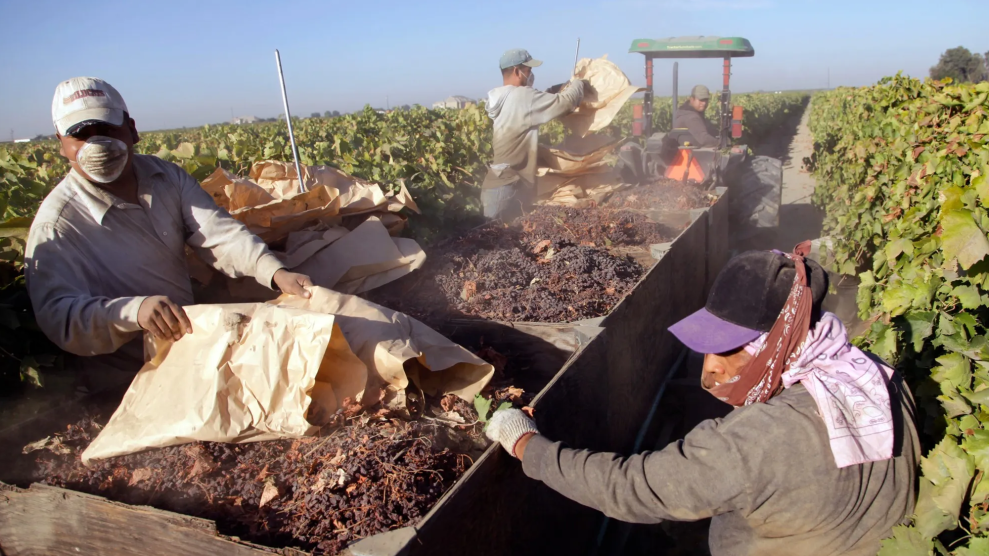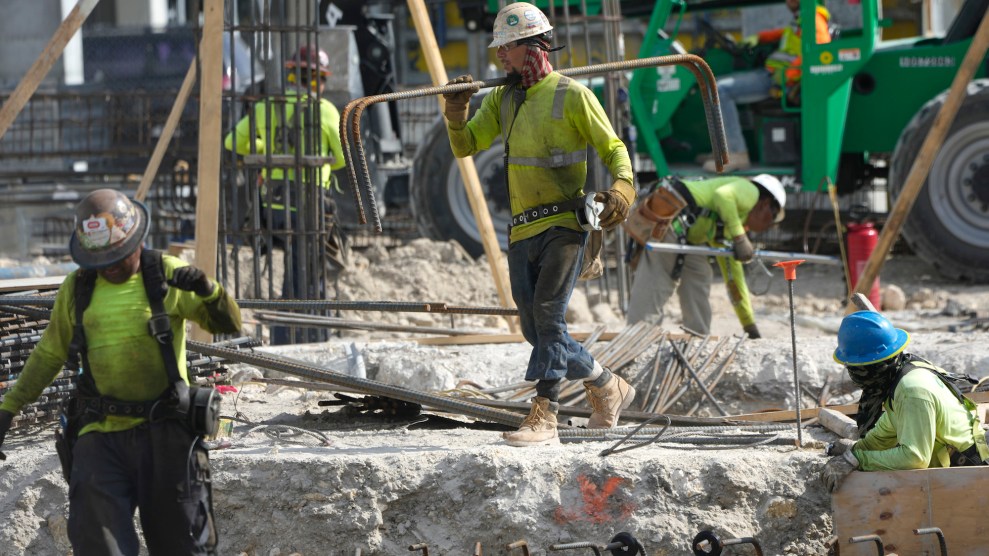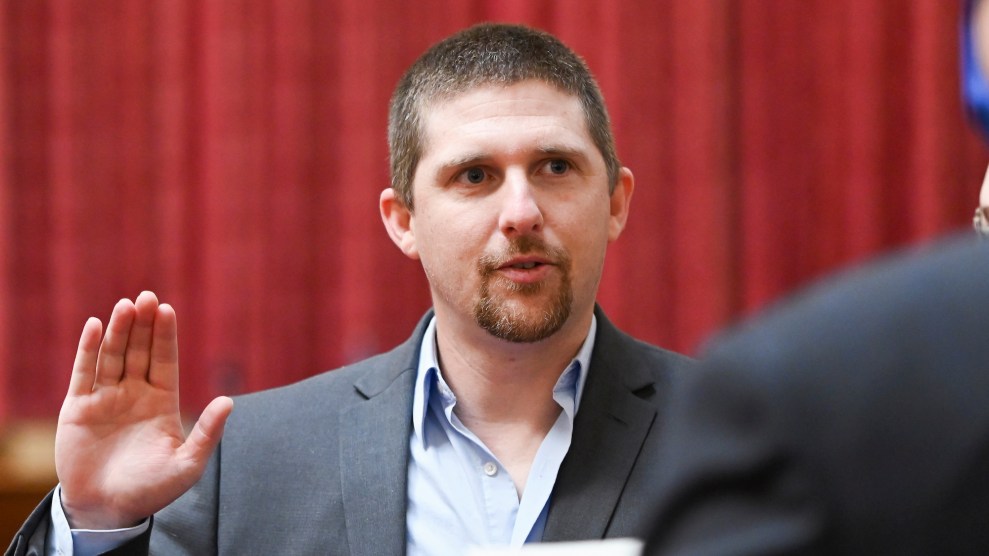
Peter Kneffel/DPA/Zuma
This story was originally published by the Guardian and is reproduced here as part of the Climate Desk collaboration.
For Javier Torres and other workers whose jobs are conducted outdoors in south Florida, the heat is unavoidable. A new law recently signed by Ron DeSantis, Florida’s Republican governor, that prohibits any municipalities in the state from passing heat protections for workers ensures that it is likely to stay that way.
Torres has seen a co-worker die from heatstroke and another rushed to the emergency room in his years of working in construction in south Florida. He has also fallen and injured himself due to heat exhaustion.
“I work outdoors and have no choice but to work in the heat. I work often in painting and, in the majority of cases, we’re exposed to direct sun and we don’t have shade. Sometimes I feel dizzy and get headaches,” said Torres.
He said employers rarely provide workers with water, leaving workers to ensure they bring enough water to work or find a hose to drink from.
The effects of extreme heat on workers are only expected to worsen due to the climate crisis. Many parts of Florida experienced record heat last year. Orlando hit 100F in August breaking a record set in 1938. The National Weather Service recently issued its outlook for summer 2024, predicting Florida summer temperatures will be warmer than normal.
“The heat can be very intense, especially as we get closer to summer,” added Torres. “What we want as workers who labor outdoors is to have water, shade and rest breaks to protect ourselves.”
At the behest of agricultural industry lobbyists, DeSantis signed HB433 into law on April 11, a bill scaling back child labor protections that also included an amendment prohibiting all local municipalities in Florida from enacting heat protections for workers.
The exemption came in response to efforts by farm workers in Miami-Dade county to pass heat protections, including proper rest breaks, access to water and shade, as increasingly warming temperatures have expanded the days farm workers are exposed to heat.
Ana Mejia, a farm worker, worked for 11 years at Costa Farms in south Florida where she said she experienced two serious heat stress incidents on the job. Costa Farms was included on the National Council for Occupational Safety and Health’s Dirty Dozen report of unsafe employers in 2024. Costa Farms declined to comment.
“I worked outdoors during my entire time at Costa Farms in temperatures that quite often exceeded 100 degrees,” said Mejia. “I had headaches, sweat excessively, my body would start to shake and tremble. I started to feel dizzy and a lack of coordination, and this feeling of shock and desperation. It was a very bad experience.”
She recounted having to be brought to onsite medical care, but only being given an electrolyte drink and finding no medical professional on site or called to help her.
“The high standards of meeting productivity quotas per day combined with working in high temperatures is putting us in danger,” added Mejia. “The rest breaks are at the discretion of supervisors and often they don’t want to give rest breaks because it will reduce the productivity of the business.”
There are currently no protections in the US for workers from heat. Only a handful of states such as California, Washington, Oregon, Colorado and Minnesota have passed any heat protections for workers.
The Occupational Safety and Health Administration is currently reviewing federal heat standard protections and issues fines against employers citing the general duty clause in cases where workers die due to heat stress, but worker groups have advocated that heat protections which include water, rest, shade, breaks, and acclimatization are needed to save workers from heat illnesses and their lives.
Up to 2,000 workers in the US die every year due to heat stress, according to a 2023 report by Public Citizen.
Several business groups are lobbying against heat protections for workers at the federal level, and lobbyists aggressively pushed lawmakers to pass the Florida heat exemption bill. Orlando Weekly reported on texts from corporate lobbyists to lawmakers urging them to pass the heat exemption bill before the end of the legislative session.
“I haven’t texted you in weeks–HEAT cannot die,” wrote Carol Bowen, a lobbyist for the Associated Builders and Contractors in a text message to the House speaker Paul Renner’s chief of staff Allison Carter on March 7, the day before the last day of the legislative session when the bill was ultimately passed. “The entire business community is in lock step on this. Thank you for your attention to this concern.”
Ahead of a vote on the bill, the Florida chamber of commerce lobbyist Carolyn Johnson told Republican lawmakers their vote on the bill would be double-weighted on the How They Voted report the chamber sends to its members.
Jeannie Economos, an organizer with the Farmworker Association of Florida, said worker advocacy groups opposing HB433 were hoping the clock would run out for the bill to get passed by the state legislature. Several labor and environmental groups sent letters imploring DeSantis to veto the bill.
“It’s incomprehensible that people who live in Florida, and are supposed to represent the people of Florida, can vote against the health and safety of the workers that make this economy run, who were considered essential workers just a couple years ago and given PPE, are now treated like this, and not giving protection from extreme heat,” said Economos. “That makes no sense and it’s unconscionable.”
She said worker advocacy groups in Florida were regrouping and planned on developing strategies on how to override the Florida law, while continuing to advocate for heat protections at the federal level and conducting heat stress trainings for outdoor workers to protect themselves.
“For us right now, while HB433 is a setback to our campaign, we know the issue of extreme heat isn’t going away anytime soon,” said Oscar Londoño, executive director of the worker advocacy non-profit WeCount!, which has been pushing for heat protections for workers through its ¡Qué Calor! campaign. “We know that the issue is going to get even more and more relevant, and that workers will need to continue to do what is necessary to protect their lives on a job, whether that is through direct action, through workplace organizing, or through ongoing corporate campaign, workers will find a way to win the protection they deserve in Florida.”










